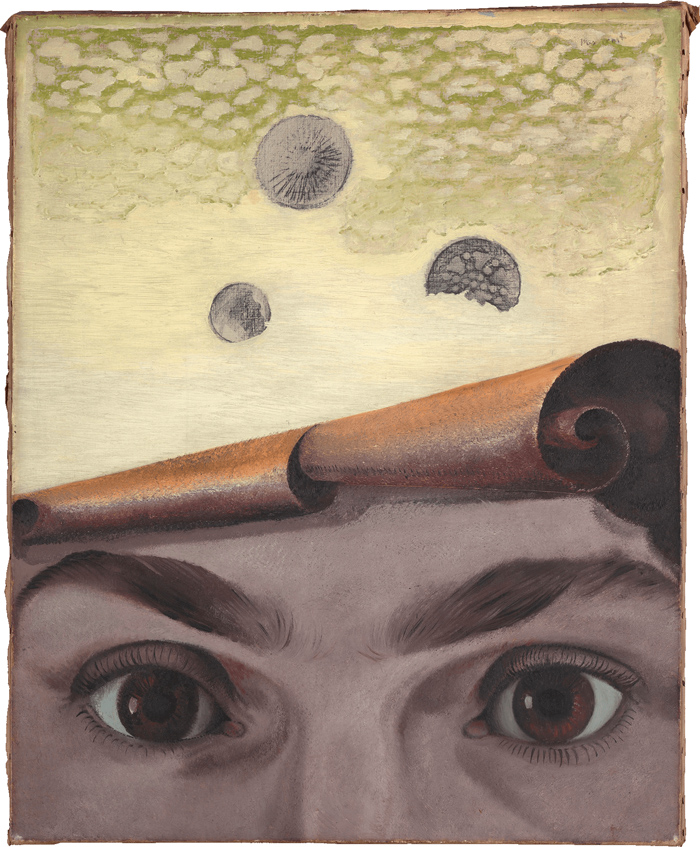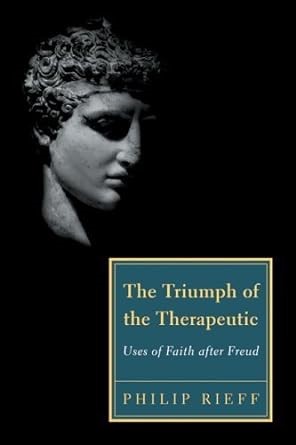This is the third in a series. Please see Parts One, Two, and Four.
by Albert Norton, Jr. (November 2023)

Gala Éluard, Max Ernst, 1924
In The Discovered Self, I introduced the interior nature of the therapeutic mindset. Then in the last post on this subject, The Therapeutic, I suggested some character traits that seem to accompany the shift from objectivity to the therapeutic. None too flattering, they are, looked at from the outside, but they seem inevitable upon making the inward shift to subjectivity and away from the stance of looking outward to values that are universal, objective, and transcendent. The move involves a heightened concern with the inner self, so psychological self-care is paramount, and is to be warily guarded even at the expense of honesty, humility, and empathy. Threats to one’s interior well-being will be greeted with suspicion and hostility. This way of thinking is the enemy of tolerance, personal responsibility, and self-control.
 What brings about psychological man? We don’t go to bed idealists and wake up selfish monsters. There has been a movement in society in which hierarchical values on a vertical moral dimension fade in significance, and became replaced over time by values increasingly formed and re-formed in the roil of social process. The mountain gives way to the river, to use analogies suggested in the title to my last book. Using the vocabulary employed by Philip Reiff, interdiction and renunciation are diminished, and release and remission emphasized.
What brings about psychological man? We don’t go to bed idealists and wake up selfish monsters. There has been a movement in society in which hierarchical values on a vertical moral dimension fade in significance, and became replaced over time by values increasingly formed and re-formed in the roil of social process. The mountain gives way to the river, to use analogies suggested in the title to my last book. Using the vocabulary employed by Philip Reiff, interdiction and renunciation are diminished, and release and remission emphasized.
Mountain and river should be in balance. Some individuals retain a mountain vision of objective, hierarchical values existing in ideals universally applicable to all. Others of a more emotive disposition readily discard the mountain vision to go splash in the river. But the mountain disposition may obtain with insufficient latitude for remission and release; insufficient deference to the significance of mystery, and aesthetics, and a sense of purpose. And likewise the river disposition may obtain with insufficient structure formed in a hierarchy of objective values. To use yet another descriptive juxtaposition, that of Friedrich Schiller, neither the “form impulse” nor “sensuous impulse” should be allowed to crowd out its opposite.
The inward turn in the subjective psychological realm corresponds to the unstructured river disposition in the realm of ideas. Both are consequences of the demise of objectivity. Truth and falsity, and good and evil, were once deemed hard-wired, so to speak, in the universe. In the postmodern era they became human products, and the processes by which they came into being the dialectic; the historicism of Hegel by which we expect ongoing change in moral standards, rather than being alarmed at their mutability.
Detachment from objectivity was inevitable upon rejection of God. Alexandr Solzhenitsyn was even more right than he probably realized, in saying “Men have forgotten God, that’s why all this has happened.” This was the theme of The Mountain and the River, so I don’t go into further explanation here, except to say it occasioned what we can summarize as a tectonic shift from structure and form, toward flow and process. As with that move in the world of ideas, so with this move in the subjective inward psychology.
As we will see, the rise of psychological man leads inexorably to the cult of victimhood that so puzzles those who remember universal values. Its most important manifestation is in matters relating to sex; also the source of the most mischief for individuals and society. And, also as we will see, there are important ramifications for mental health—not just in the sense that psychology relates to mental processes, but in the sense that we suffer disorders of various kinds that seem new because they are. We will consider mental health in connection with biology and the psychology of social contagion. But first, let’s get our bearings from Reiff, one of the more significant early observers of the transition to psychological man.

Reiff famously wrote in a somewhat elusive style, making the reader work for the layers of tightly woven meaning in each sentence. We can come to better understand the level of abstraction he was working at if we take some care with some of his key words and concepts. First, Reiff makes clear at the outset of The Triumph of the Therapeutic that the starting point for all of what follows is the death of God in the postmodern imagination. He cited thinkers like Matthew Arnold and Friedrich Nietzsche who were prescient enough, in the 19th century, to worry about what would come next upon the crumbling of the religious structure for how we understand ourselves as human beings. This point is even more central in Reiff’s much later work Charisma (2006). The question, he wrote, is no longer Dostoyevsky’s: “Can civilized men believe?” but rather “whether unbelieving men can be civilized.”
Before Freud, character was thought to be revealed in how one responded to external challenges. This is a part of the religious conception, in which we are free to exercise moral agency to attain peace with our conscience, which is in turn imbued in us by God, the Source of moral values universally applicable among human beings.
Freud’s conception of the id changed all that. He identified the “id” as the source of primal, innate, instinctive impulses, in tension with the superego by which we bring to bear rational restrictions on those instincts. Instead of character being revealed in how we respond to external challenges, it is revealed in how a person responds to internal tensions. It is how a person defends himself against his own potentially dangerous impulses.
Freud advocated psychoanalytic process to accomplish this, and his influence on how we came to think of human beings was enormous beyond our ability to imagine. We’re all Freudians, now, because we remove God to ethereal theory or imagine Him out of existence altogether. This leaves us without an understanding of moral tension within, between the natural (or dust-formed) and spiritual (or God-breathed).
This failure of understanding opens us to an ill-explained psychological tension, instead. Out with morality; in with psychology. There must be some materialist explanation for the inner turmoil we feel, therefore. Freud’s theories were more descriptive than explanatory, but they were enough. They fit the scientistic and materialist prejudices of the rapidly secularizing twentieth century. The Freudian construct of inner psychic tensions marked a decisive inward turn, in our thinking, toward psychological man. The tensions among the inner components of the human psyche replace the conscience, in explaining why we do what we do, and are what we are.
This transition to inner man can be understood as a shift from the vertical to the horizontal; from the transcendent to the immanent. So this is a quite fundamental shift in the way human beings understand themselves. They’re cut off from God, so they’re cut off from transcendent Source in formation of values and truth. While the austere verticality of transcendence is removed altogether, a form of horizontal immanence remains; a form more congenial to the inner man. Theologically, immanence refers to God’s activity in the world. In Christianity, the work of Jesus with us for a time, and then the Holy Spirit. Without God, one can still imagine an active presence, but it is material rather than spiritual. It is social, and historicist, and dialectical.
As always, the bleak secularism of this age borrows from theological ideas to construct a materialism that seems less brutal than it is; which retains a vague sense of larger meaning and purpose even if that is only the sum of humanity moving and acting in the world, generating social norms, Durkheimian “social facts” which take the place of a transcendent God.
This faux immanence smooths the shift from fear of the Lord to finding values in the roil of social process. We seek psychological reconciliation with our surroundings, rather than with a God who knows my faults. This shift from vertical to horizontal in our subjective psychologies mirrors the same kind of shift in philosophical propositions. Just as postmodernism is the advent of process philosophy to replace theology, so the inner turn to psychological man is the advent of subjective emotivism to replace an outward-facing reliance on objectivity and universality, and ultimately, transcendence.
Table of Contents
Albert Norton, Jr is an attorney and author. His most recent book is The Mountain and the River: Genesis, Postmodernism, and the Machine (New English Review Press 2023).
NER on Twitter @NERIconoclast
- Like
- Digg
- Del
- Tumblr
- VKontakte
- Buffer
- Love This
- Odnoklassniki
- Meneame
- Blogger
- Amazon
- Yahoo Mail
- Gmail
- AOL
- Newsvine
- HackerNews
- Evernote
- MySpace
- Mail.ru
- Viadeo
- Line
- Comments
- Yummly
- SMS
- Viber
- Telegram
- Subscribe
- Skype
- Facebook Messenger
- Kakao
- LiveJournal
- Yammer
- Edgar
- Fintel
- Mix
- Instapaper
- Copy Link










4 Responses
Our conscience represents our God within. Embarassment, sense of shame signals the psychosomato entity, us, that a therapeutic rebalancing of attitude and action are being called for. Paying attention to those signals is a form of civilizing maturation.
As that is going on, we oscillate between being Boke Woke and Wise.
True. Your comment makes me think of the shocking antisemitism evident now, because it is said to come from anger that Jews “invented the conscience.” That idea in turn presupposes that good and evil are not imputed to the conscience by God; rather, that our conceptions of good and evil are all social constructs. If that were true we’d be truly lost. It’s bad enough that so many seem convinced that standards of good and evil are mutable, the product of social negotiation in ongoing Hegelian dialectic.
I don’t think all values actually are universal, else why so many human belief systems that do not all say the same?
But material reality is universal, at least, and that can and does shape a lot of the moral and intellectual superstructure and does mean many things are or have become common.
The cult of subjectivity more or less denies even that.
Certainly not “all” values are universal. Some things are matters of personal preference. Universal values, by definition, are neither personal nor matters of subjective preference. They are values held across all belief systems, so I don’t think difference among belief systems belies their universality. Values like honesty, generosity, charity, and rectitude, and against violence, promiscuity, and theft are universal, and manifest in the conscience regardless of human belief system.
I don’t know what you mean about universality of material reality. But if you mean a rejection of Platonism in favor of exclusively material particularity, wouldn’t that mean values of sociability evolve, but all other values are subjective and personal? Seems like that would make a “cult of subjectivity” inevitable, if by “cult of subjectivity” you mean all values are personal and matters of preference.